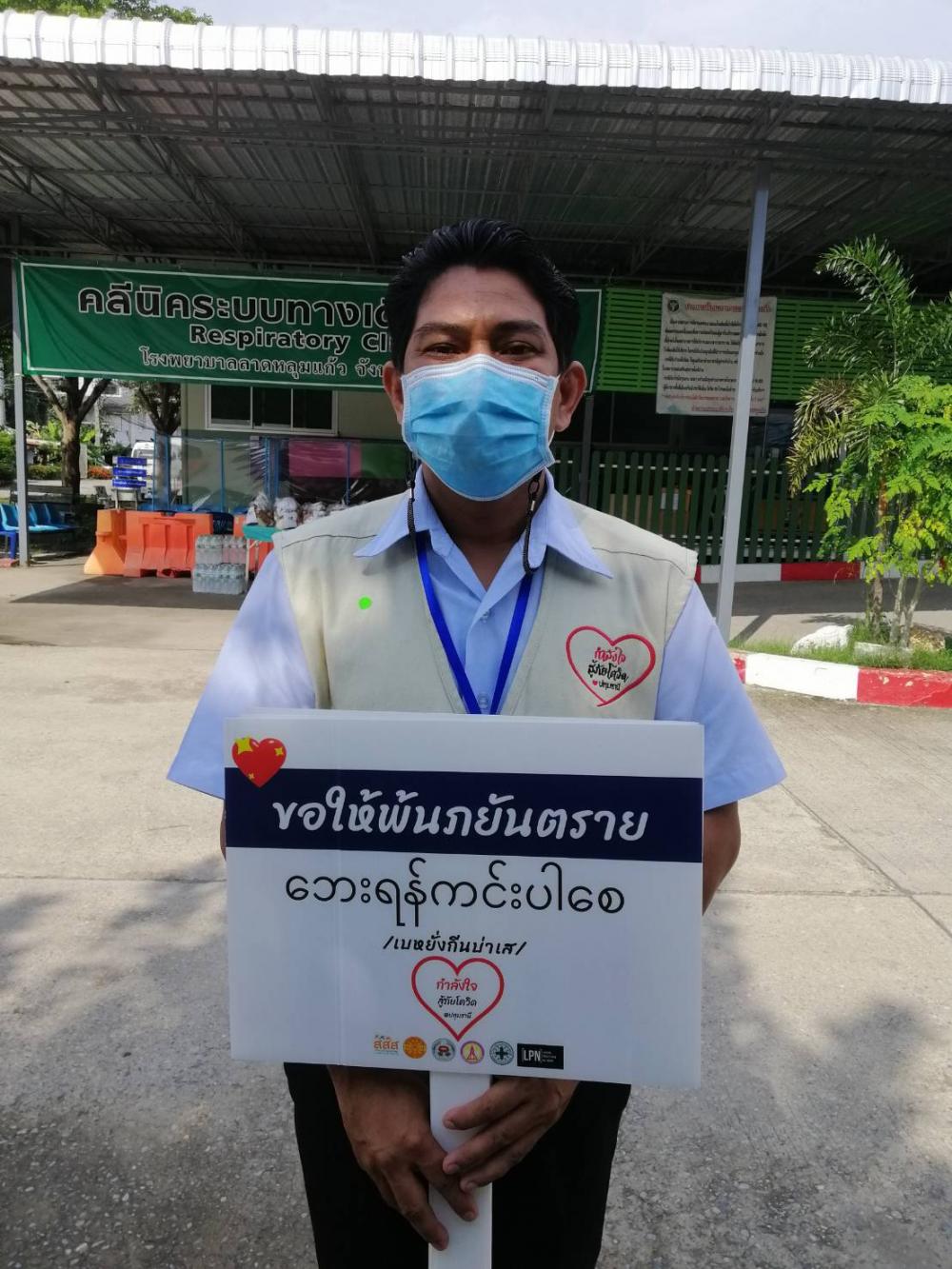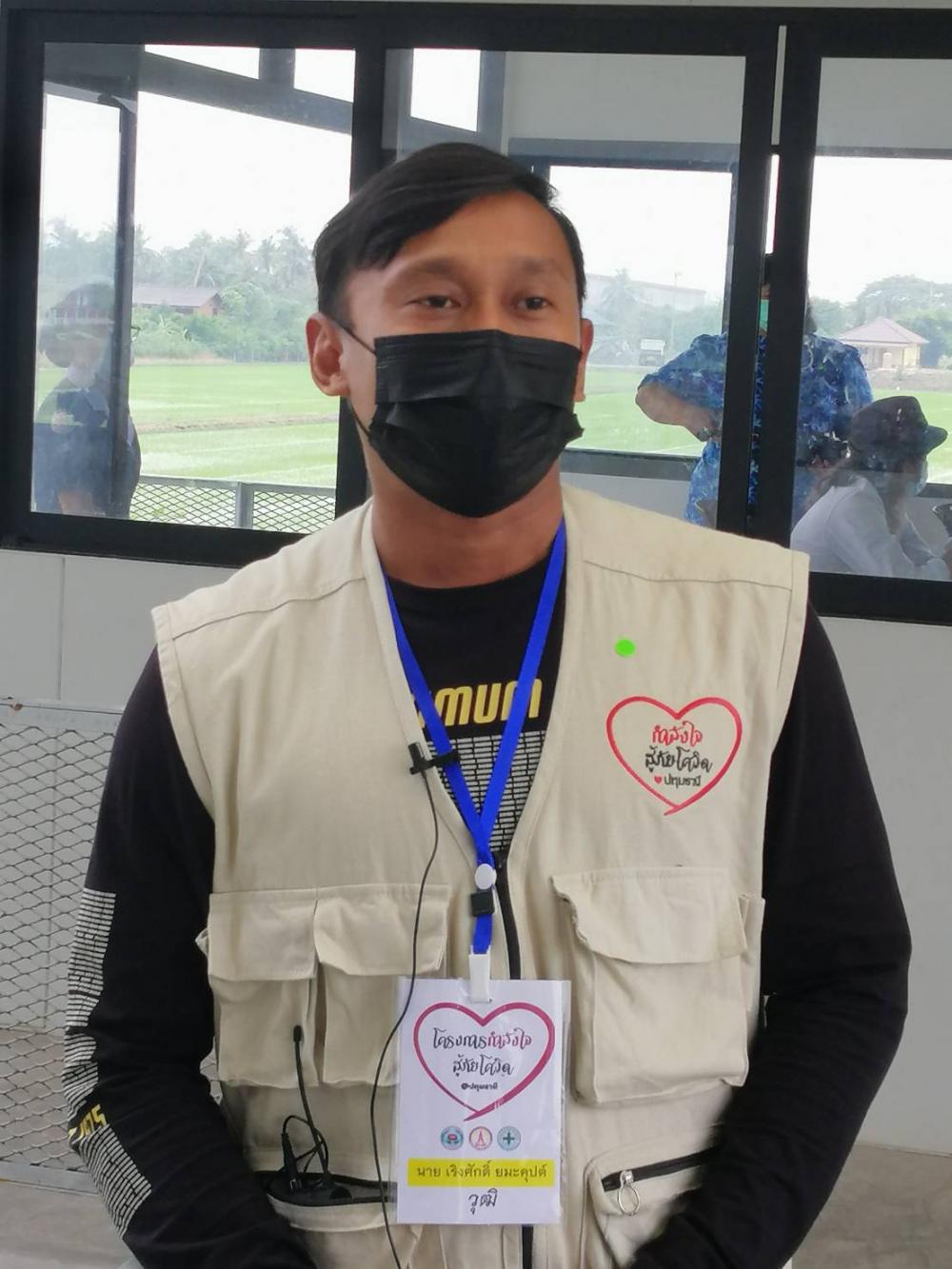Alarmed by a surge of infections in the kingdom's third wave, a support group has been formed to help patients cope with stress brought on by the illness and discrimination they may experience despite fully recovering.
The Pathum Thani-based support group comprises three Covid-19 survivors who contracted the virus during the first wave of the pandemic last year.
According to the support group, Covid-19 patients are under tremendous stress and have a lot of questions running through their minds.
Will they fully recover or will things get worse? What medicines are they getting? Have they lost their jobs? Will they be discriminated against after being discharged?
The support team visits Covid-19 patients at a field hospital at Thammasat University, Rangsit campus, and some hospitals in the province. It works closely with the field hospital's social workers.
Their job is to extend support, trying to help the patients understand their experience and ease their worries.
Putting himself in their shoes
Podchanat Yamyim, 41, a taxi driver who was among the first to be infected, said it did not take him time to consider whether to join the group when approached by the provincial governor and social workers at the field hospital.

Podchanat Yamyim holds a message of support for Covid-19 patients.
When Mr Podchanat was hospitalised, he was practically alone; he talked to his wife and his mother only and was able to see his children via video chats. No visits were allowed from friends nor relatives.
"I was a Covid-19 survivor and had already shared my experiences with the public. I feel good that I can help by talking to the patients and making them feel less worried even just a bit," he said.
He said the patients seem to feel better after talking to him.
"It feels like we can relate to each other. For most of the questions they throw at me, I can answer. I had been there," he said.
Mr Podchanat was admitted for Covid-19 treatment for 14 days at the Thanyaburi Hospital in Pathum Thani and was isolated for another 14 days at the field hospital at the Rangsit campus. He self-isolated at home for another full month before returning to work.
Despite fully recovering from the virus, Mr Podchanat said people in the community were "afraid" to get close to him and some even avoided walking past his house. He could picture other former Covid-19 patients being treated in the same manner.
Mr Podchanat is not concerned that he will be reinfected and he is required to wear protective gear when doing his rounds at the field hospital.
"The most frequently asked questions are: what did I do while being hospitalised? What are my symptoms? And will they recover? They won't talk to me if I don't tell them that I'm a former patient," he said.
Other volunteer work which Mr Podchanat does is arrange taxi trips for those who are to be discharged from the field hospital.
He said some taxi drivers have a better understanding of the virus and how it spreads and some agree to provide services free of charge for those who cannot afford to pay.
More support groups needed
Kornkanok Hamtanon, another member of the support group, said she is fully aware of how the virus can take a heavy emotional toll on the patients -- the boredom from being quarantined, the stress from being out of work and the anxiety of not knowing when she would recover.

Kornkanok Hamtanon makes time to visit Covid-19 patients twice a week.
She said she was assessed by health specialists who said she was suffering from severe anxiety disorder and in need of professional help.
"Even after I was discharged, some friends didn't want to socialise with me. It took them months to understand," she said.
Ms Kornkanok contracted the virus in the first wave while working as a cashier at a night entertainment venue.
She currently makes a living by selling sandwiches in the Phra Ram Kao area while visiting patients at the field hospital twice a week and doing video calls with them when time allows.
Giving support to Covid-19 patients is her first attempt at volunteer work and she feels proud of herself every time she sees patients smile and offer their thanks.
According to Ms Kornkanok, most Covid-19 patients feel lonely and stressed as there is not much they can do and several find it really difficult to adjust.
"I wish we could have support groups in every province. I don't think doctors and nurses can fill in for the patients when it comes to struggling with quarantine. Only those who have the experience can," she said.
Rerngsak Yamakupt, 45, who works in sales, has joined the support effort for the past three months and the more he talks to Covid-19 patients, the more he sees how important support groups are to those affected.

Rerngsak Yamakupt gets prepped for a patient visit at Lat Lum Kaeo Hospital.
"Many are concerned they will lose their jobs. Some people told me they were bullied by supervisors and some were clearly depressed. They seem to be more optimistic and encouraged after getting advice," he said.
According to Mr Rerngsak, support for the Covid-19 patients extends beyond the field hospital as a team of social workers has been put together to help them if they face problems.
Mr Rerngsak also visits Covid-19 patients at hospitals in Pathum Thani, approximately 10 cases per day. If he is unable to make visits, he will do video calls, about five cases per day.
One of the most heart-breaking cases for him was a family being treated at Sam Khok hospital. They are deeply worried about being discriminated against and bullied.
"We have a surge in patients and it's high time to give the Covid-19 infected people the support they need and help them arm themselves against discrimination," he said.
Curbing social stigma
Khanittha Booranaphansak, chief of social work at Thammasat Hospital who is behind the support group project, expressed concerns about social stigma against Covid-19 patients, saying former patients face blame, rejection and discrimination when returning to their communities.
"Social stigma against Covid-19 patients makes suspected patients, who need medical attention, refuse testing until their conditions deteriorate," she said.
She said the Covid-19 patients are struggling emotionally and physically and help should be extended to them. In this wave, about 40% of them suffer from stress and severe anxiety.
"I want the support groups to be formed to create a better understanding and relieve the social stigma on patients and those who fully recovered. The risks of them suffering depression are high," she said.
The support group has three members who visit patients at field hospitals in the province, mainly the field hospital in Thammasat University, Rangsit campus.
As of April 28, there reportedly are 569 patients at eight field hospitals and 330 are in the Thammasat field hospital which was first set up when the outbreak erupted early last year.